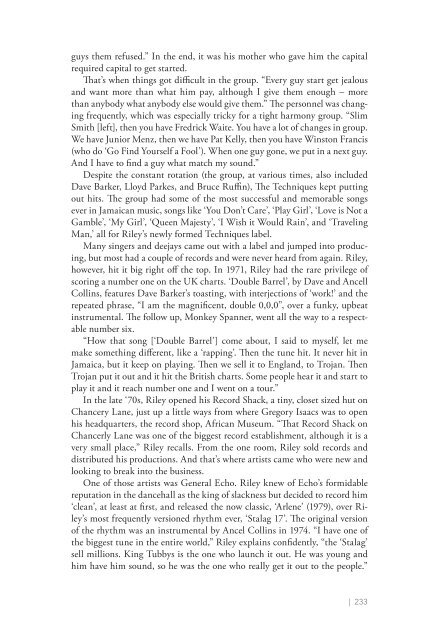Create successful ePaper yourself
Turn your PDF publications into a flip-book with our unique Google optimized e-Paper software.
guys them refused.” In the end, it was his mother who gave him the capital<br />
required capital to get started.<br />
That’s when things got difficult in the group. “Every guy start get jealous<br />
and want more than what him pay, although I give them enough – more<br />
than anybody what anybody else would give them.” The personnel was changing<br />
frequently, which was especially tricky for a tight harmony group. “Slim<br />
Smith [left], then you have Fredrick Waite. You have a lot of changes in group.<br />
We have Junior Menz, then we have Pat Kelly, then you have Winston Francis<br />
(who do ‘Go Find Yourself a Fool’). When one guy gone, we put in a next guy.<br />
And I have to find a guy what match my sound.”<br />
Despite the constant rotation (the group, at various times, also included<br />
Dave Barker, Lloyd Parkes, and Bruce Ruffin), The Techniques kept putting<br />
out hits. The group had some of the most successful and memorable songs<br />
ever in Jamaican music, songs like ‘You Don’t Care’, ‘Play Girl’, ‘Love is Not a<br />
Gamble’, ‘My Girl’, ‘Queen Majesty’, ‘I Wish it Would Rain’, and ‘Traveling<br />
Man,’ all for Riley’s newly formed Techniques label.<br />
Many singers and deejays came out with a label and jumped into producing,<br />
but most had a couple of records and were never heard from again. Riley,<br />
however, hit it big right off the top. In 1971, Riley had the rare privilege of<br />
scoring a number one on the UK charts. ‘Double Barrel’, by Dave and Ancell<br />
Collins, features Dave Barker’s toasting, with interjections of ‘work!’ and the<br />
repeated phrase, “I am the magnificent, double 0,0,0”, over a funky, upbeat<br />
instrumental. The follow up, Monkey Spanner, went all the way to a respectable<br />
number six.<br />
“How that song [‘Double Barrel’] come about, I said to myself, let me<br />
make something different, like a ‘rapping’. Then the tune hit. It never hit in<br />
Jamaica, but it keep on playing. Then we sell it to England, to Trojan. Then<br />
Trojan put it out and it hit the British charts. Some people hear it and start to<br />
play it and it reach number one and I went on a tour.”<br />
In the late ‘70s, Riley opened his Record Shack, a tiny, closet sized hut on<br />
Chancery Lane, just up a little ways from where Gregory Isaacs was to open<br />
his headquarters, the record shop, African Museum. “That Record Shack on<br />
Chancerly Lane was one of the biggest record establishment, although it is a<br />
very small place,” Riley recalls. From the one room, Riley sold records and<br />
distributed his productions. And that’s where artists came who were new and<br />
looking to break into the business.<br />
One of those artists was General Echo. Riley knew of Echo’s formidable<br />
reputation in the dancehall as the king of slackness but decided to record him<br />
‘clean’, at least at first, and released the now classic, ‘Arlene’ (1979), over Riley’s<br />
most frequently versioned rhythm ever, ‘Stalag 17’. The original version<br />
of the rhythm was an instrumental by Ancel Collins in 1974. “I have one of<br />
the biggest tune in the entire world,” Riley explains confidently, “the ‘Stalag’<br />
sell millions. King Tubbys is the one who launch it out. He was young and<br />
him have him sound, so he was the one who really get it out to the people.”<br />
| 233


